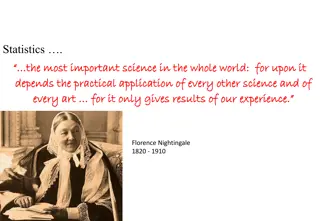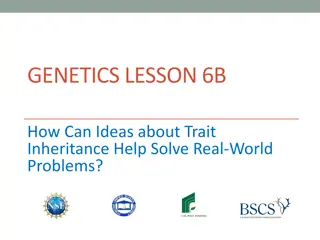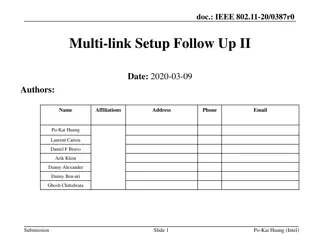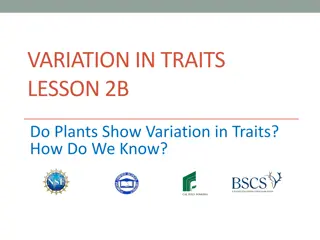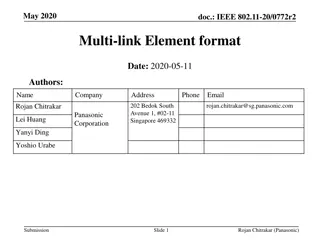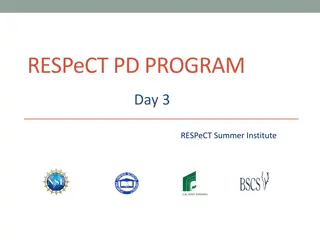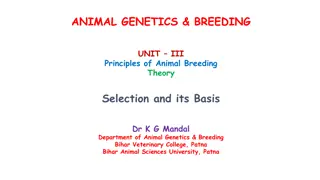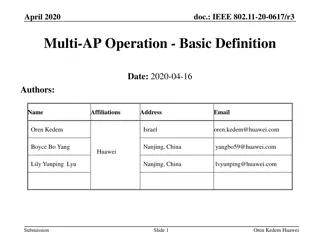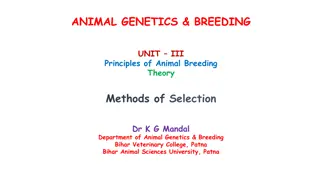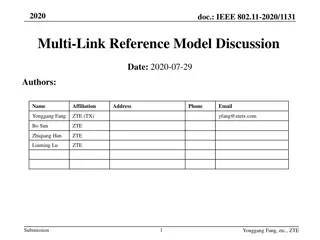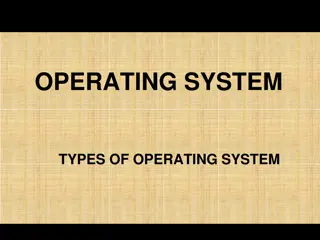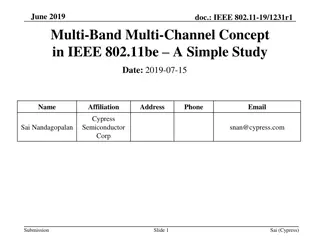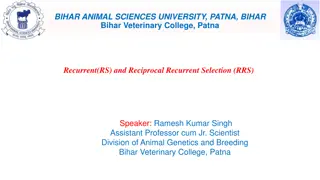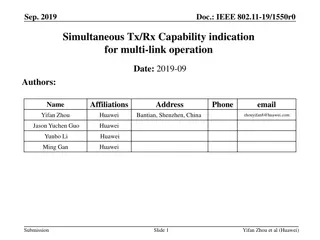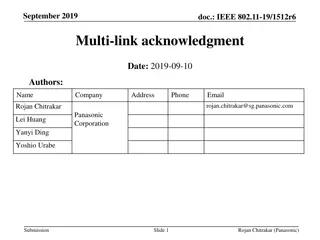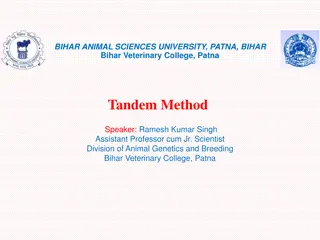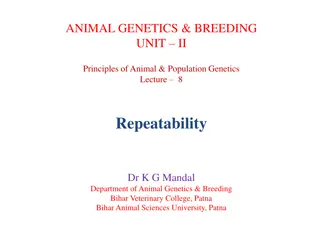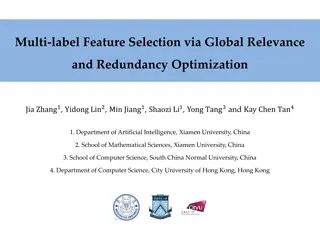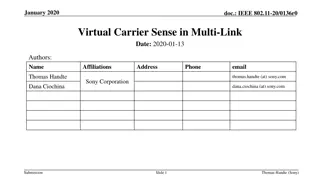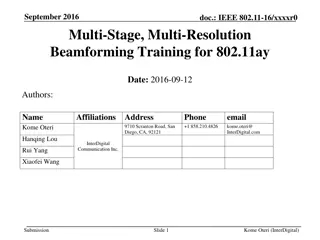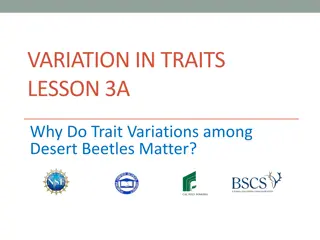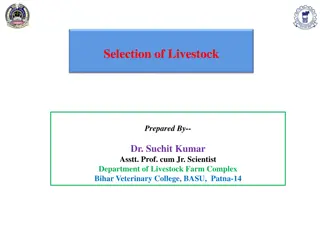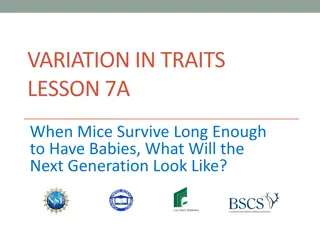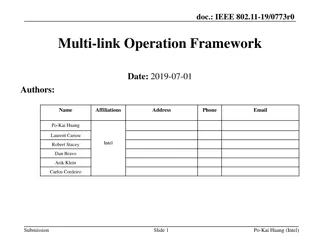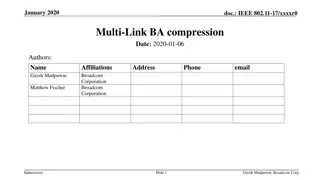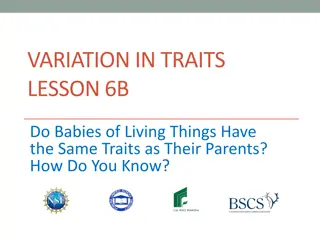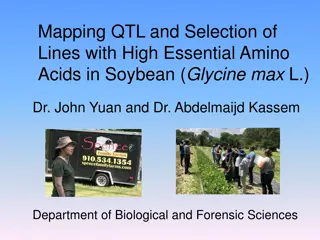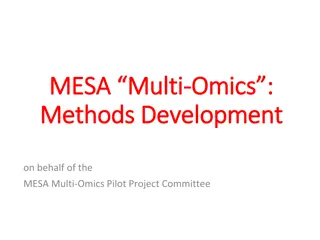Understanding Logistic Regression Model Selection in Statistics
Statistics, as Florence Nightingale famously said, is the most important science in the world. In this chapter on logistic regression, we delve into model selection, interpretation of parameters, and methods such as forward selection, backward elimination, and stepwise selection. Guidelines for sele
4 views • 33 slides
Understanding Sickle Cell Trait in Intercollegiate Athletics
Sickle cell trait is a hereditary condition affecting red blood cells' shape and oxygen-carrying capacity. Individuals with this trait can experience complications during intense exercise, leading to health risks in athletics. This article explores the impact of sickle cell trait on athletes, the re
0 views • 15 slides
Understanding Trait Inheritance for Real-World Problem Solving
Discover how the study of trait inheritance in genetics helps solve real-world problems through examples like the Wilson family case study. Explore key concepts such as chromosomes, genes, alleles, dominant and recessive traits, and the Hansen family pedigree to grasp the significance of genetic inh
0 views • 13 slides
Progress on IEEE 802.11 Multi-link Setup
Significant developments have been made in the multi-link setup within the IEEE 802.11 framework. The focus is on allowing only one STA in the MLD framework, differentiation with STA-level associations, and the rationale behind restricting to one STA. Proposals for defining multi-link devices and re
0 views • 12 slides
Exploring Plant Traits: Do Plants Exhibit Variation in Traits?
Discover in this lesson whether plants display variations in traits through the measurement of plant lengths. Students analyze data tables of carrots and leaves to observe trait variations and discuss patterns found in bar graphs and data tables. The focus is on understanding how to identify and int
0 views • 11 slides
IEEE 802.11-20/0772r2 Multi-Link Elements Overview
IEEE 802.11-20/0772r2 discusses various aspects of multi-link elements in the context of IEEE 802.11 standards. The document covers the need for efficient element ID extension, different multi-link element structures, including authentication algorithms, common controls, and sub-elements organizatio
1 views • 10 slides
Enhancing Science Learning Through Student Thinking Strategies
Explore Day 3 of the RESPeCT Summer Institute focusing on STL strategies, lesson analysis, traits variation, and student engagement in scientific thinking. Uncover trends in reflections, student questions, and activities that advance science learning without rote memorization. Delve into the purpose
0 views • 67 slides
Principles of Animal Breeding: Selection and its Basis
Selection in animal breeding involves choosing the best individuals to improve specific traits. Criteria for selection include individual merit, competitive exams, and interviews. Selection of farm animals focuses on non-random reproduction of genotypes. Types of selection include natural and artifi
1 views • 40 slides
Understanding Multi-AP Operation in IEEE 802.11-20-0617/r3
Explore the basic definitions and key features of Multi-AP operation in the IEEE 802.11 standard. Learn about Multi-AP Candidate Set (M-AP-CS) and Multi-AP Operation Set (M-AP-OS) along with their participants and formation. Delve into the concepts of Coordinator AP, Coordinated AP(s), and reliable
0 views • 19 slides
Principles of Animal Breeding Theory and Methods of Selection
Animal breeding involves selecting for desirable traits to improve the overall merit of animals. Methods such as tandem selection and multi-trait selection are used to enhance genetic progress. Economic value, genetic significance, and selection criteria play important roles in the breeding process.
1 views • 16 slides
IEEE 802.11-2020 Multi-Link Reference Model Discussion
This contribution discusses the reference model to support multi-link operation in IEEE 802.11be and proposes architecture reference models to support multi-link devices. It covers aspects such as baseline architecture reference models, logical entities in different layers, Multi-Link Device (MLD) f
1 views • 19 slides
Understanding Different Types of Operating Systems
An operating system is the crucial program that manages a computer's resources and acts as an interface between the user and the machine. Various types of operating systems exist, including real-time, multi-user vs. single-user, multi-tasking vs. single-tasking, distributed, and embedded systems. Re
1 views • 11 slides
Essential Heroic Trait Comparison: Atticus vs. Another Hero
A comparative analysis through an argumentative synthesis essay between Atticus from TKAM and another hero, focusing on the most crucial trait all heroes should possess. The essay addresses opposing claims and highlights the importance of a singular heroic attribute.
0 views • 25 slides
Understanding Personality Traits and Assessments
Psychologists utilize traits to describe personality, addressing common misunderstandings about introversion and exploring the strengths and weaknesses of personality inventories. The consistency of personality traits over time and across situations is examined, along with the identification of insi
0 views • 38 slides
IEEE 802.11-23/1980r1 Coordinated AP-assisted Medium Synchronization Recovery
This document from December 2023 discusses medium synchronization recovery leveraging multi-AP coordination for multi-link devices. It covers features such as Multi-link device (MLD), Multi-link operation (MLO), and Ultra High Reliability (UHR) capability defined in P802.11bn for improvements in rat
0 views • 8 slides
Understanding Multi-Band Multi-Channel Concept in IEEE 802.11be
Exploring the benefits of Multi-Band Multi-Channel (MBMC) operation in IEEE 802.11be, this study delves into the efficient use of spectrum, increased data rates, and network load balancing. It also discusses the envisioned usage models and compares Single Band Operation with Multi-Band Operation, hi
1 views • 20 slides
Understanding Multi-Band, Multi-Channel Concept in IEEE 802.11be
Explore the advantages of Multi-Band, Multi-Channel (MBMC) operation in IEEE 802.11be, focusing on efficient spectrum use, increased data rates, and dynamic band switching. Learn about usage models and compare with single-band operations. Discover how MBMC enables concurrent operation across multipl
0 views • 22 slides
Understanding Selection Strategies in Animal Genetics and Breeding
Genes influence traits through Additive Gene Action (AGA) and Non-Additive Gene Action (NAGA) in animal breeding. Recurrent Selection (RS) and Reciprocal Recurrent Selection (RRS) play crucial roles in improving animals. Selection for General Combining Ability (GCA) and Specific Combining Ability (S
0 views • 16 slides
IEEE 802.11-19/1550r0: Simultaneous Tx/Rx Capability Indication for Multi-Link Operation
This document discusses the simultaneous Tx/Rx capability indication for multi-link operation in IEEE 802.11-19/1550r0. It covers scenarios where link selection depends on link capabilities, actions needed based on Tx/Rx capabilities, and methods to indicate simultaneous operation. The importance of
4 views • 10 slides
Enhancing IEEE 802.11 with Multi-Link Acknowledgment Mechanism
This document explores the concept of multi-link transmission in IEEE 802.11 networks as a means to enhance peak throughput. It delves into the proposal of a multi-link block acknowledgment mechanism for more efficient data transmission. The discussion includes details on existing block acknowledgme
0 views • 16 slides
Tandem Method in Animal Breeding: Sequential Traits Selection
Tandem method in animal breeding involves selecting useful traits sequentially to improve genetic performance. Breeders focus on one trait until a desired level is achieved before moving on to the next trait. While effective in targeted improvement, the method can lead to loss of previously improved
0 views • 6 slides
Understanding Repeatability in Animal Genetics and Breeding
Repeatability in animal genetics assesses the correlation between repeated measurements of a trait on the same individuals. It partitions phenotypic variance into within-individual and between-individual components, aiding in estimating heritability, resemblance between relatives, and genetic determ
0 views • 18 slides
Global Relevance and Redundancy Optimization in Multi-label Feature Selection
The study focuses on optimizing multi-label feature selection by balancing global relevance and redundancy factors, aiming to enhance the efficiency and accuracy of data analysis. It delves into the challenges posed by information theoretical-based methods and offers insights on overcoming limitatio
0 views • 15 slides
Virtual Carrier Sense in Multi-Link Networks
This document discusses the implementation and advantages of virtual carrier sense in multi-link networks under the IEEE 802.11 standard. It explores the operation of multi-link setups, asynchronous communication benefits, and the necessity of multiple contention channels. The concept of NAV (Networ
2 views • 11 slides
Accuracy of Multi-Month Refills of Antiretroviral Drugs in Malawi
Understanding the implementation of multi-month refills for stable patients in Malawi provides valuable insights into patient eligibility differentiation, with 86% eligible for multi-month scripts. Challenges remain in accurately applying eligibility criteria, as seen in the study's findings. The re
0 views • 13 slides
Performance Aspects of Multi-link Operations in IEEE 802.11-19/1291r0
This document explores the performance aspects, benefits, and assumptions of multi-link operations in IEEE 802.11-19/1291r0. It discusses the motivation for multi-link operation in new wireless devices, potential throughput gains, classification of multi-link capabilities, and operation modes. The s
0 views • 30 slides
Understanding Natural Selection in Higher Biology
Natural selection in action is demonstrated through mutations that impact an organism's adaptation to changing environments. Sickle cell anemia, a genetically transmitted blood disorder, exemplifies the consequences of specific mutations. The condition manifests in various symptoms, affecting indivi
0 views • 18 slides
Multi-Stage, Multi-Resolution Beamforming Training for IEEE 802.11ay
In September 2016, a proposal was introduced to enhance the beamforming training procedures in IEEE 802.11ay for increased efficiency and MIMO support. The proposal suggests a multi-stage, multi-resolution beamforming training framework to improve efficiency in scenarios with high-resolution beams a
0 views • 11 slides
Understanding Natural Selection and Its Mechanisms
Explore the concepts of natural selection, survival of the fittest, and various types of selection processes in evolutionary biology. From the struggle for existence to sexual selection, learn how organisms adapt to their environment through genetic contributions and mating strategies. Discover exam
0 views • 8 slides
Importance of Trait Variations in Desert Beetles
Exploring the significance of trait variations among desert beetles, this lesson delves into why variations matter and how they impact survival in the desert environment. Through activities and discussions, students analyze traits, predict beetle survival, and understand the implications of variatio
0 views • 10 slides
Brigade Commander and Staff Selection Process Decision Briefing
In the decision briefing for the selection process of APS JROTC Brigade Commander and Staff, the purpose is to determine the best process that meets the needs, constraints, and preferences. The plan is to implement a standardized nomination and evaluation process in the selection of Brigade Commande
0 views • 18 slides
Understanding Selection Methods in Livestock Breeding
Livestock breeding involves various methods of selection such as individual selection, pedigree selection, progeny selection, and more. These methods aim to improve desirable traits in animals through controlled breeding programs. Selection criteria include performance, genetic lineage, and specific
0 views • 27 slides
Understanding Trait Variation: Survival of Mice in Changing Environments
The lesson explores how trait variation, specifically fur color, impacts the survival of mice in their environment. By examining how different fur colors help mice blend in and avoid predators, students learn about the role of natural selection and inheritance in shaping future generations of mice.
0 views • 12 slides
IEEE 802.11-19/0773r0 Multi-link Operation Framework Summary
The document discusses the multi-link operation framework for IEEE 802.11-19/0773r0, focusing on load balancing and aggregation use cases. It introduces terminology related to multi-link logical entities and provides examples of multi-link AP and non-AP logical entities. The framework considers stee
0 views • 16 slides
Understanding Multi-morbidity and Deprivation in UK General Practice
Exploring the association between multi-morbidity, deprivation, and life expectancy in the context of UK general practice. The research aims to quantify socio-economic inequalities in chronic disease onset and life expectancy, particularly among older populations with multi-morbidity. Methods includ
0 views • 27 slides
IEEE 802.11-17: Enhancing Multi-Link Operation for Higher Throughput
The document discusses IEEE 802.11-17/xxxxr0 focusing on multi-link operation for achieving higher throughput. It covers motions adopted in the SFD related to asynchronous multi-link channel access, mechanisms for multi-link operation, and shared sequence number space. Additionally, it explores the
0 views • 14 slides
Overview of DICOM WG21 Multi-Energy Imaging Supplement
The DICOM WG21 Multi-Energy Imaging Supplement aims to address the challenges and opportunities in multi-energy imaging technologies, providing a comprehensive overview of imaging techniques, use cases, objectives, and potential clinical applications. The supplement discusses the definition of multi
0 views • 33 slides
Understanding Trait Variation in Living Things
Explore the concept of trait inheritance in living organisms through interactive activities and engaging visuals. Discover whether babies of living things inherit the same traits as their parents and learn how to observe and compare traits between parents and offspring. Dive into the fascinating wor
0 views • 15 slides
Mapping QTL and Selection of Soybean Lines with High Essential Amino Acids
Soybean (Glycine max L.) plays a crucial role as a crop in North Carolina, especially for its essential amino acids content critical for human and animal nutrition. This study aims to identify quantitative trait loci (QTL) for essential amino acids in soybean seeds using a genetic map from the Forre
0 views • 4 slides
Advancing Multi-Omics Research with Integrated Methods
Exploring the importance of multi-variate methods in multi-omics research to integrate diverse datasets such as phenotypes, metabolites, expression, methylation, and SNPs. The overview covers matrix-based methods, sparse methods for feature selection, and an example analysis from the MESA Multi-Omic
0 views • 17 slides
